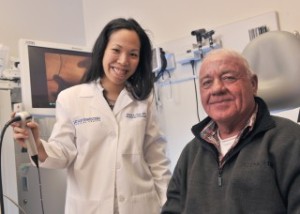Apr 7 2014
Stephen Wiley, a lifelong cowboy from Terrell, has helped UT Southwestern Medical Center pioneer a new treatment for vocal cord cancer. Mr. Wiley volunteered to be the world’s first known patient to be treated for vocal cord cancer with CyberKnife, a surgeon-controlled robotic device that destroys tumors with highly precise doses of radiation.
 Dr. Susie Chen, Assistant Professor of Radiation Oncology (left), oversaw CyberKnife treatments for patient Stephen Wiley. Credit: UT Southwestern Medical Center
Dr. Susie Chen, Assistant Professor of Radiation Oncology (left), oversaw CyberKnife treatments for patient Stephen Wiley. Credit: UT Southwestern Medical Center
Mr. Wiley, a yard driver for a manufacturing company who also raises horses on his own time, said he started waking up in the morning with a hoarse voice and thought it was nothing more than aging. It got continually worse, until one day he was reduced to a whisper.
“We have to talk on the radio constantly and whenever my voice went away, it was a safety issue,” said Mr. Wiley, 59.
Doctors found tumors in both his vocal cords, and referred him to UT Southwestern, where he met with Dr. Larry Myers, Assistant Professor of Otolaryngology-Head and Neck Surgery.
“Dr. Myers said, ‘Well, we’ve been looking for someone like yourself for a research project that’s never been done before.’ I said, ‘Heck, if it works and it’s going to help other people, I’m willing to go for it,’ ” Mr. Wiley recalled. “It has worked out great. People here at work say, ‘Your voice is back to normal.’”
Six doctors had to unanimously agree that Mr. Wiley was a good candidate for the procedure, which he said gave him confidence that the CyberKnife trial was right for him. The $7 million CyberKnife, built by the California-based company Accuray, has a small linear particle accelerator and a robotic arm that allows it to treat tumors on any part of the body with radiation, explained his surgeon, Dr. Baran Sumer, Associate Professor of Otolaryngology – Head and Neck Surgery. There are no records from the maker or in medical literature of the robotic device previously being used to treat vocal cord cancer.
UT Southwestern doctors’ success with treating Mr. Wiley yielded important information that UT Southwestern physicians are already using to make treatment shorter for other people with vocal cord tumors, said Dr. Sumer, also a member of the Harold C. Simmons Comprehensive Cancer Center, the only National Cancer Institute-designated cancer center in North Texas.
Only about 200 of these cutting-edge machines exist in the world, most of them in the United States. Dr. Susie Chen, Assistant Professor of Radiation Oncology, oversaw Mr. Wiley’s treatments and said the unique resources, expertise, and collaborative atmosphere at UT Southwestern aligned perfectly to break new ground in cancer treatment and find the right solution for Mr. Wiley.
“We’re in a very unique situation at UT Southwestern where we have the tools to do it. It takes a lot of collaboration between the surgeons and the radiation doctors to actually get that done. The technology just hasn’t been there until recently,” she said.
Patients must be as still as possible for the CyberKnife treatment to be precise, but vocal cords move when people breathe and swallow, presenting a challenge in using the precision robot. Dr. Sumer injected tiny bits of gold into Mr. Wiley’s neck for the CyberKnife to track so the robotic arm could adjust to even the slightest movements. Mr. Wiley’s head also was covered with a mesh mask that held him snug and still.
“With the CyberKnife, it’s real time. When something moves, it’s actually moving. We adjust to the movement,” Dr. Chen said. “The whole time you’re getting treated, there are little x-rays that are being done that allow the machine to lock on to these little gold markers that are placed near the vocal cords. It’s just like you’re a fighter pilot, and you lock on to a target.”
Mr. Wiley completed his 15 treatments at St. Paul University Hospital. “With the CyberKnife, I never lost my voice and never lost any weight. It’s great and I feel great,” he said.
Three other UT Southwestern patients have since had CyberKnife treatment on vocal cord tumors, and Dr. Chen said they have been able to reduce the number of treatments each time as more is learned about the CyberKnife’s effectiveness on vocal cord tumors.
“What we’ve done is taken a treatment that takes five and a half weeks, and we’re decreasing it,” Dr. Chen said. “The true goal of this study is to maintain excellent cure rates while decreasing the time of radiation and side effects. That’s the biggest thing – ease for the patient.”
The Harold C. Simmons Comprehensive Cancer Center brings innovative cancer care to the region, while fostering groundbreaking basic research that has the potential to improve patient care and prevention of cancer worldwide.
About UT Southwestern Medical Center
UT Southwestern, one of the premier academic medical centers in the nation, integrates pioneering biomedical research with exceptional clinical care and education. The institution’s faculty includes many distinguished members, including five who have been awarded Nobel Prizes since 1985. Numbering more than 2,700, the faculty is responsible for groundbreaking medical advances and is committed to translating science-driven research quickly to new clinical treatments. UT Southwestern physicians provide medical care in 40 specialties to nearly 91,000 hospitalized patients and oversee more than 2 million outpatient visits a year.
Source: http://www.utsouthwestern.edu/